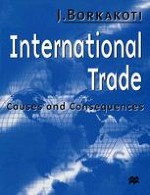1998 | OriginalPaper | Buchkapitel
The Classical View: Specialisation and Exchange, Absolute and Comparative Advantage
verfasst von : J. Borkakoti
Erschienen in: International Trade: Causes and Consequences
Verlag: Macmillan Education UK
Enthalten in: Professional Book Archive
Aktivieren Sie unsere intelligente Suche, um passende Fachinhalte oder Patente zu finden.
Wählen Sie Textabschnitte aus um mit Künstlicher Intelligenz passenden Patente zu finden. powered by
Markieren Sie Textabschnitte, um KI-gestützt weitere passende Inhalte zu finden. powered by
In dealing with a subject in a comprehensive manner, it is imperative to discuss, even if very briefly, how the subject evolved over time, that is, one ought to have a glance at the history of the development of thought, and in this instance, in the theory of international trade. We will begin with the Mercantilist doctrine, as expounded by John Hales and Thomas Mun (1571–1641), which dominated the sixteenth and seventeenth century England of commercial capitalism which itself was the precursor to industrial capitalism. It is during the period of industrial revolution that Adam Smith (1723–90) published his Wealth of Nations in 1776, and the father of economics expounded the doctrine of free trade. Smith was followed by other perspicacious economists: David Ricardo (1772–1823), Robert Torrens (1780–1864), Friedrich List (1789–1846) and John Stuart Mill (1806–73) who made specific contributions to the theory of international trade.
